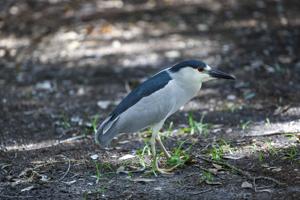Visitors to Charleston's White Point Garden should stay alert over the next few weeks. Night herons have set up at the park on the peninsula's southern tip for their summer nesting season, and they're defecating all over unsuspecting tourists, joggers and parkgoers. As rising seas pressure rookeries across South Carolina, places like White Point provide an imperfect refuge for the next generation of the sometimes beloved (and often despised) birds.
"A lot of people are surprised that they're there because, from a human perspective, that is a very busy and touristy area," said Mandy Feavel, director of programs and operations at the Awendaw-based Avian Conservation Center and Center for Birds of Prey. "The reason they're probably there is White Point Garden has those beautiful oak trees." The park is home to three species of night herons, according to the Conservation Center: yellow-crowned night herons, black-crowned night herons and tri-colored herons.

White Point's old oak trees provide an ideal site for the largely nocturnal birds to lay eggs and support hatchlings, Feavel said. A juvenile night heron in Charleston's White Point Garden, July 11, 2024. Young herons are a common sight in the peninsula park during the summer.
Heron chicks take several weeks to learn how to fly, and those first few days of life are the birds' most vulnerable. Feavel said the rate of heron injury in the White Point rookery is higher than at other rookery sites across the state. A rookery is an .
















